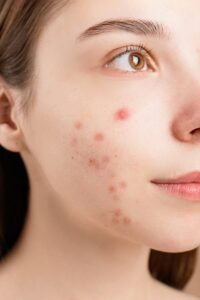Acne
 Acne is a prevalent skin condition that affects people of all ages, but it’s most common during adolescence. It occurs when hair follicles become clogged with oil and dead skin cells, leading to the formation of pimples, blackheads, whiteheads, and inflamed lesions. Here’s an overview of its symptoms, causes, and treatments:
Acne is a prevalent skin condition that affects people of all ages, but it’s most common during adolescence. It occurs when hair follicles become clogged with oil and dead skin cells, leading to the formation of pimples, blackheads, whiteheads, and inflamed lesions. Here’s an overview of its symptoms, causes, and treatments:
Consulting a dermatologist is essential for proper diagnosis and personalized treatment plans tailored to individual needs and severity of acne. With appropriate care and management, acne can be effectively controlled, improving both physical symptoms and overall quality of life.
Acne typically presents with the following symptoms:
Blackheads and Whiteheads: Non-inflammatory lesions caused by blocked pores.
Papules and Pustules: Inflamed lesions characterized by redness and pus.
Nodules and Cysts: Deep, painful lumps beneath the skin’s surface that may lead to scarring.
Oily Skin: Excess oil production contributing to the development of acne lesions.
Scarring: Persistent or severe acne can result in long-lasting scars.
Excess Oil Production: Hormonal changes during puberty stimulate the sebaceous glands to produce more oil, which can clog pores.
Clogged Pores: Dead skin cells and oil accumulation block hair follicles, promoting the growth of acne-causing bacteria.
Bacterial Infection: Propionibacterium acnes (P. acnes) bacteria thrive in clogged pores, leading to inflammation and acne formation.
Hormonal Changes: Fluctuations in hormone levels, particularly during puberty, menstruation, pregnancy, or hormonal disorders, can trigger acne.
Genetics: Family history of acne may increase the likelihood of developing the condition.
Dietary Factors: Certain foods, such as high-glycemic index foods and dairy products, may exacerbate acne in some individuals.
Treatment options for acne aim to reduce oil production, unclog pores, eliminate bacteria, and reduce inflammation. Common treatments include:
Topical Treatments: Over-the-counter or prescription creams, gels, and lotions containing ingredients like benzoyl peroxide, salicylic acid, retinoids, or antibiotics.
Oral Medications: Antibiotics, hormonal therapy (birth control pills), or isotretinoin (Accutane) may be prescribed for moderate to severe acne.
Procedures: Dermatological procedures such as chemical peels, microdermabrasion, laser therapy, or extraction of comedones may help improve acne symptoms and prevent scarring.
Lifestyle Changes: Practicing good skincare habits, avoiding harsh products, maintaining a healthy diet, managing stress, and not picking or squeezing acne lesions can help manage and prevent acne outbreaks.

